七年级英语第5讲-7BU3-42023年安徽中考英语中考综合复习-教案
文档属性
| 名称 | 七年级英语第5讲-7BU3-42023年安徽中考英语中考综合复习-教案 | 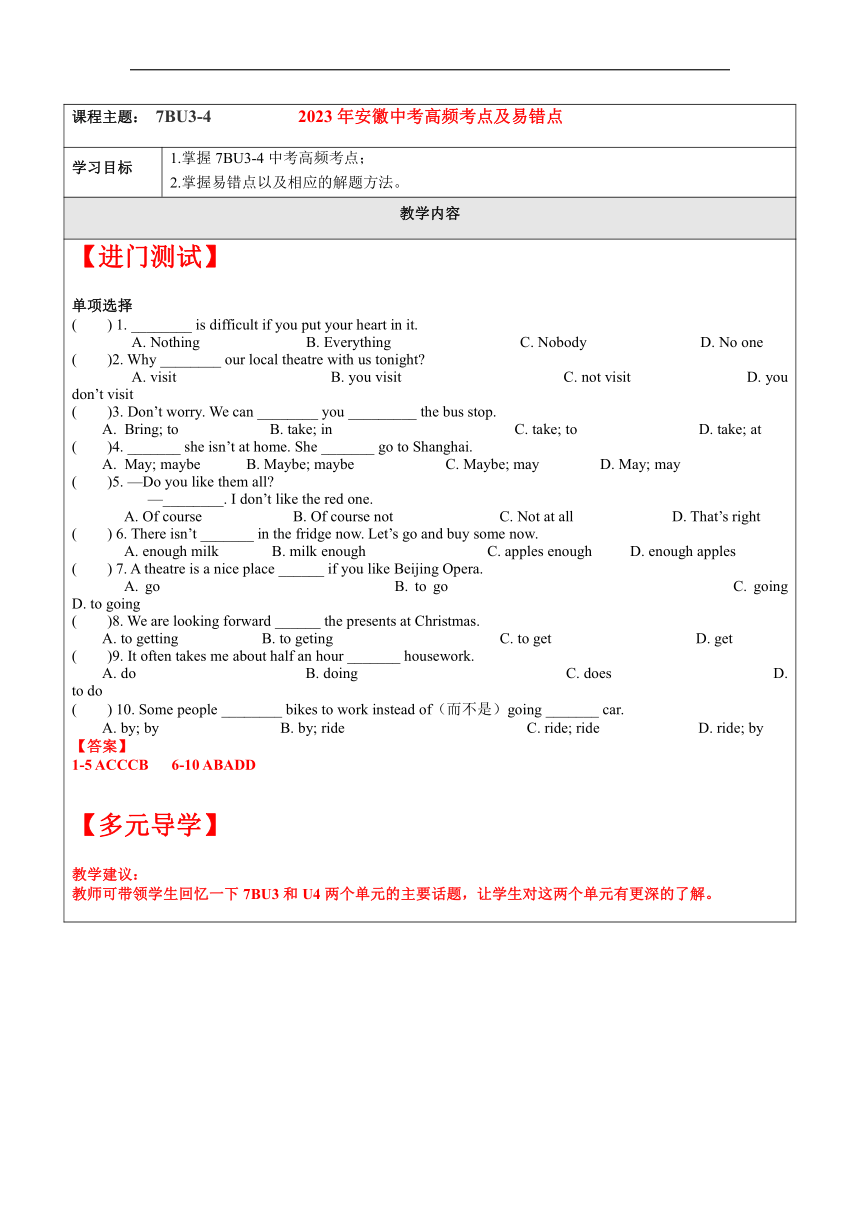 | |
| 格式 | doc | ||
| 文件大小 | 226.5KB | ||
| 资源类型 | 教案 | ||
| 版本资源 | 通用版 | ||
| 科目 | 英语 | ||
| 更新时间 | 2023-04-18 18:09:44 | ||
图片预览

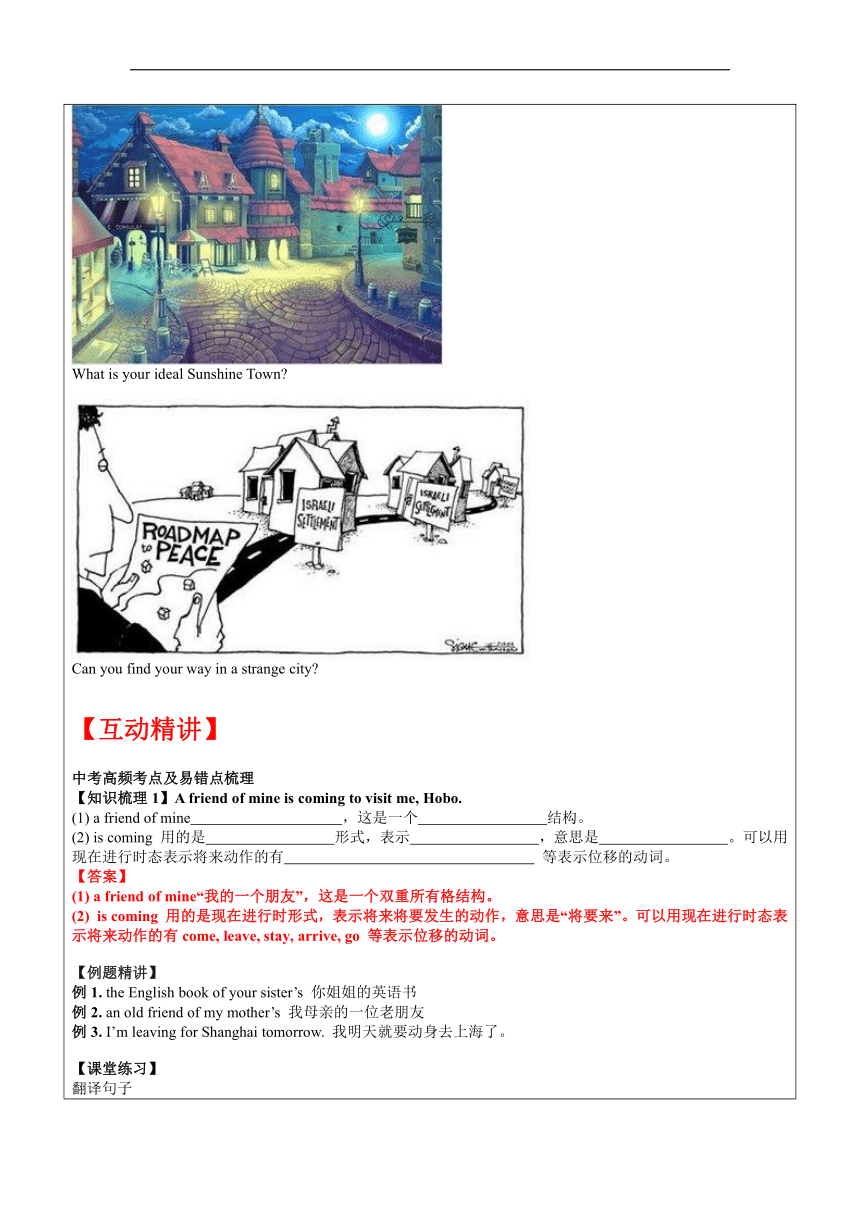
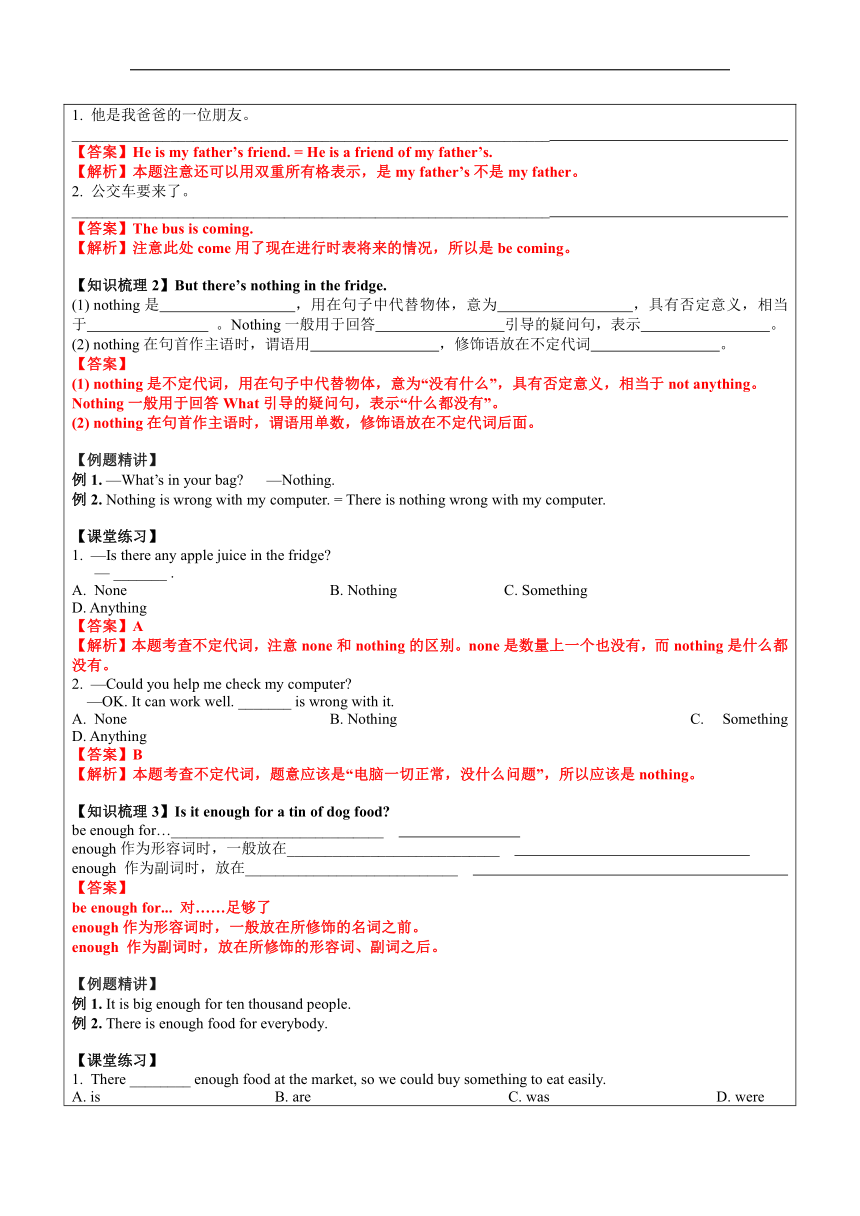
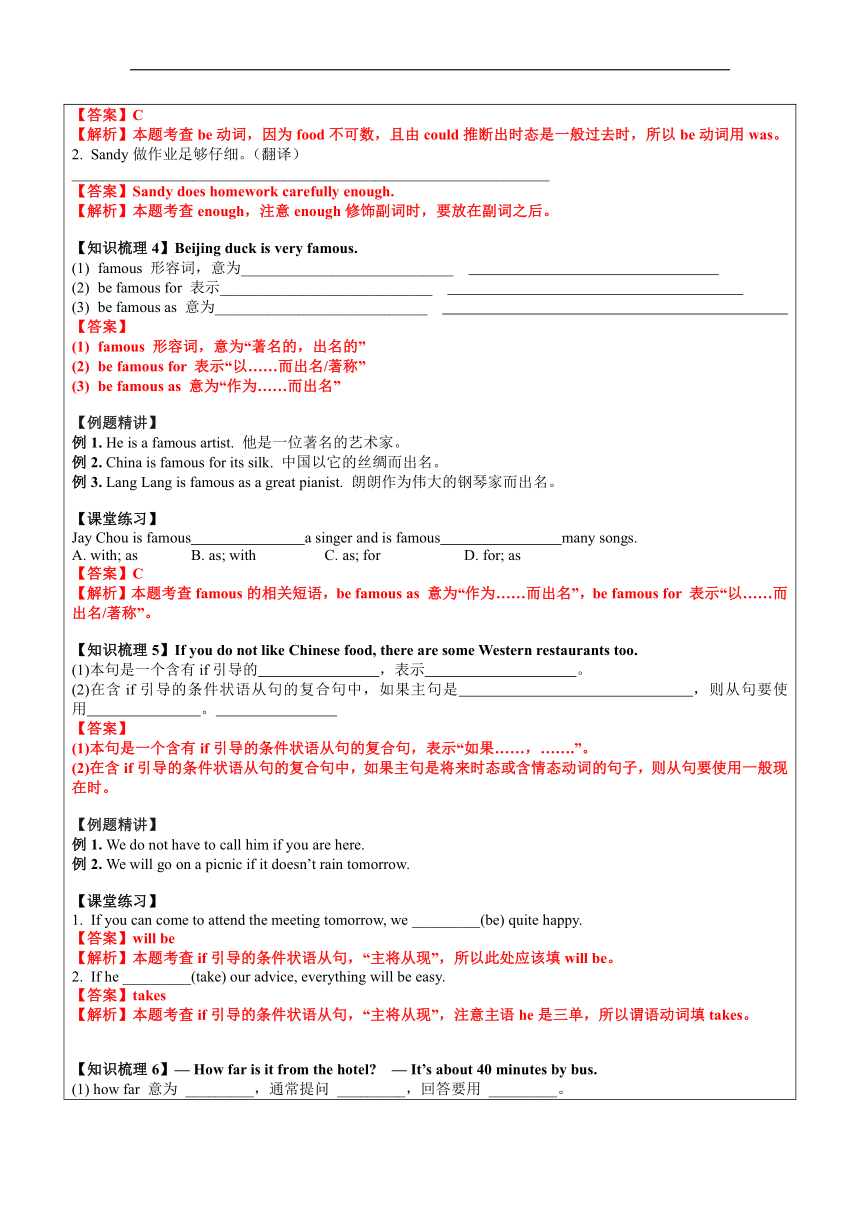
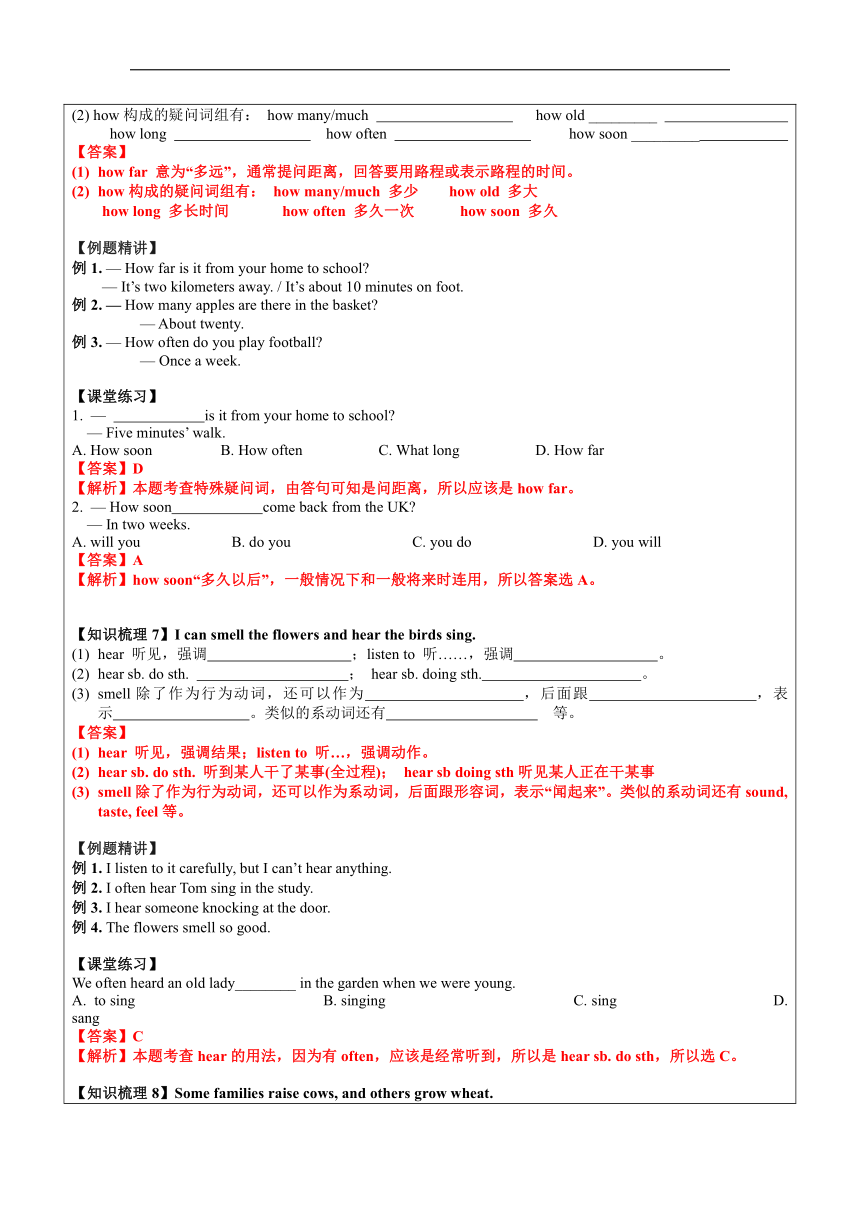
文档简介
课程主题: 7BU3-4 2023年安徽中考高频考点及易错点
学习目标 1.掌握7BU3-4中考高频考点;2.掌握易错点以及相应的解题方法。
教学内容
【进门测试】单项选择( ) 1. ________ is difficult if you put your heart in it. A. Nothing B. Everything C. Nobody D. No one( )2. Why ________ our local theatre with us tonight A. visit B. you visit C. not visit D. you don’t visit( )3. Don’t worry. We can ________ you _________ the bus stop.Bring; to B. take; in C. take; to D. take; at( )4. _______ she isn’t at home. She _______ go to Shanghai.May; maybe B. Maybe; maybe C. Maybe; may D. May; may( )5. —Do you like them all —________. I don’t like the red one. A. Of course B. Of course not C. Not at all D. That’s right( ) 6. There isn’t _______ in the fridge now. Let’s go and buy some now. A. enough milk B. milk enough C. apples enough D. enough apples( ) 7. A theatre is a nice place ______ if you like Beijing Opera. A. go B. to go C. going D. to going( )8. We are looking forward ______ the presents at Christmas.A. to getting B. to geting C. to get D. get( )9. It often takes me about half an hour _______ housework.A. do B. doing C. does D. to do( ) 10. Some people ________ bikes to work instead of(而不是)going _______ car.A. by; by B. by; ride C. ride; ride D. ride; by【答案】 1-5 ACCCB 6-10 ABADD【多元导学】教学建议:教师可带领学生回忆一下7BU3和U4两个单元的主要话题,让学生对这两个单元有更深的了解。What is your ideal Sunshine Town Can you find your way in a strange city 【互动精讲】中考高频考点及易错点梳理【知识梳理1】A friend of mine is coming to visit me, Hobo.(1) a friend of mine ,这是一个 结构。(2) is coming 用的是 形式,表示 ,意思是 。可以用现在进行时态表示将来动作的有 等表示位移的动词。【答案】(1) a friend of mine“我的一个朋友”,这是一个双重所有格结构。is coming 用的是现在进行时形式,表示将来将要发生的动作,意思是“将要来”。可以用现在进行时态表示将来动作的有come, leave, stay, arrive, go 等表示位移的动词。【例题精讲】例1. the English book of your sister’s 你姐姐的英语书例2. an old friend of my mother’s 我母亲的一位老朋友例3. I’m leaving for Shanghai tomorrow. 我明天就要动身去上海了。【课堂练习】翻译句子他是我爸爸的一位朋友。_______________________________________________________________ 【答案】He is my father’s friend. = He is a friend of my father’s.【解析】本题注意还可以用双重所有格表示,是my father’s不是my father。公交车要来了。_______________________________________________________________ 【答案】The bus is coming.【解析】注意此处come用了现在进行时表将来的情况,所以是be coming。 【知识梳理2】But there’s nothing in the fridge.(1) nothing是 ,用在句子中代替物体,意为 ,具有否定意义,相当于 。Nothing一般用于回答 引导的疑问句,表示 。(2) nothing在句首作主语时,谓语用 ,修饰语放在不定代词 。【答案】 (1) nothing是不定代词,用在句子中代替物体,意为“没有什么”,具有否定意义,相当于not anything。Nothing一般用于回答What引导的疑问句,表示“什么都没有”。(2) nothing在句首作主语时,谓语用单数,修饰语放在不定代词后面。【例题精讲】例1. —What’s in your bag —Nothing.例2. Nothing is wrong with my computer. = There is nothing wrong with my computer.【课堂练习】—Is there any apple juice in the fridge — _______ .None B. Nothing C. Something D. Anything【答案】A【解析】本题考查不定代词,注意none和nothing的区别。none是数量上一个也没有,而nothing是什么都没有。—Could you help me check my computer —OK. It can work well. _______ is wrong with it.None B. Nothing C. Something D. Anything【答案】B【解析】本题考查不定代词,题意应该是“电脑一切正常,没什么问题”,所以应该是nothing。【知识梳理3】Is it enough for a tin of dog food be enough for…____________________________ enough作为形容词时,一般放在____________________________ enough 作为副词时,放在____________________________ 【答案】be enough for... 对……足够了enough作为形容词时,一般放在所修饰的名词之前。enough 作为副词时,放在所修饰的形容词、副词之后。【例题精讲】例1. It is big enough for ten thousand people. 例2. There is enough food for everybody. 【课堂练习】There ________ enough food at the market, so we could buy something to eat easily.A. is B. are C. was D. were【答案】C【解析】本题考查be动词,因为food不可数,且由could推断出时态是一般过去时,所以be动词用was。Sandy做作业足够仔细。(翻译)_______________________________________________________________【答案】Sandy does homework carefully enough.【解析】本题考查enough,注意enough修饰副词时,要放在副词之后。【知识梳理4】Beijing duck is very famous.famous 形容词,意为____________________________ be famous for 表示____________________________ be famous as 意为____________________________ 【答案】famous 形容词,意为“著名的,出名的”be famous for 表示“以……而出名/著称”be famous as 意为“作为……而出名”【例题精讲】例1. He is a famous artist. 他是一位著名的艺术家。例2. China is famous for its silk. 中国以它的丝绸而出名。例3. Lang Lang is famous as a great pianist. 朗朗作为伟大的钢琴家而出名。【课堂练习】Jay Chou is famous a singer and is famous many songs.A. with; as B. as; with C. as; for D. for; as【答案】C【解析】本题考查famous的相关短语,be famous as 意为“作为……而出名”,be famous for 表示“以……而出名/著称”。【知识梳理5】If you do not like Chinese food, there are some Western restaurants too. 本句是一个含有if引导的 ,表示 。(2)在含if引导的条件状语从句的复合句中,如果主句是 ,则从句要使用 。 【答案】(1)本句是一个含有if引导的条件状语从句的复合句,表示“如果……,…….”。(2)在含if引导的条件状语从句的复合句中,如果主句是将来时态或含情态动词的句子,则从句要使用一般现在时。【例题精讲】例1. We do not have to call him if you are here. 例2. We will go on a picnic if it doesn’t rain tomorrow. 【课堂练习】If you can come to attend the meeting tomorrow, we _________(be) quite happy.【答案】will be【解析】本题考查if引导的条件状语从句,“主将从现”,所以此处应该填will be。If he _________(take) our advice, everything will be easy.【答案】takes【解析】本题考查if引导的条件状语从句,“主将从现”,注意主语he是三单,所以谓语动词填takes。【知识梳理6】— How far is it from the hotel — It’s about 40 minutes by bus.(1) how far 意为 _________,通常提问 _________,回答要用 _________。 (2) how构成的疑问词组有: how many/much how old _________ how long how often how soon _________ 【答案】how far 意为“多远”,通常提问距离,回答要用路程或表示路程的时间。how构成的疑问词组有: how many/much 多少 how old 多大 how long 多长时间 how often 多久一次 how soon 多久【例题精讲】例1. — How far is it from your home to school — It’s two kilometers away. / It’s about 10 minutes on foot. 例2. — How many apples are there in the basket — About twenty. 例3. — How often do you play football — Once a week. 【课堂练习】— is it from your home to school — Five minutes’ walk.A. How soon B. How often C. What long D. How far【答案】D【解析】本题考查特殊疑问词,由答句可知是问距离,所以应该是how far。— How soon come back from the UK — In two weeks.A. will you B. do you C. you do D. you will【答案】A【解析】how soon“多久以后”,一般情况下和一般将来时连用,所以答案选A。【知识梳理7】I can smell the flowers and hear the birds sing.hear 听见,强调 ;listen to 听……,强调 。hear sb. do sth. ; hear sb. doing sth. 。 smell除了作为行为动词,还可以作为 ,后面跟 ,表示 。类似的系动词还有 等。【答案】hear 听见,强调结果;listen to 听…,强调动作。hear sb. do sth. 听到某人干了某事(全过程); hear sb doing sth听见某人正在干某事 smell除了作为行为动词,还可以作为系动词,后面跟形容词,表示“闻起来”。类似的系动词还有sound, taste, feel等。【例题精讲】例1. I listen to it carefully, but I can’t hear anything. 例2. I often hear Tom sing in the study. 例3. I hear someone knocking at the door. 例4. The flowers smell so good. 【课堂练习】We often heard an old lady________ in the garden when we were young.to sing B. singing C. sing D. sang【答案】C【解析】本题考查hear的用法,因为有often,应该是经常听到,所以是hear sb. do sth,所以选C。【知识梳理8】Some families raise cows, and others grow wheat. some... and others... ;others在此用作 ,相当于 。 one... the other... 。raise 动词,意为 。 【答案】some... and others ... “一些…… 还有一些…… ”或“一些人……另一些人……”;others在此用作代词,相当于other (形容词) + 名词。one... the other... (两个中的)一个……另一个……。raise 动词,意为“饲养,养育;提高;筹募”。 【例题精讲】例1. There are many boys on the playground. Some are playing football, and others are swimming. 例2. I have two pens. One is black, the other is blue. 例3. My grandfather raised two sheep last year. 例4. He raised his arms above his head. 例5. I want to raise money for Project Hope. 【课堂练习】The old man had two children. One became a general while the other (be) a gardener.【答案】was 【解析】本题考查one...the other...“一个......,另一个......”,注意此处时态是一般过去时。Some charities spend plenty of time (raise) money for those poor children.【答案】raising【解析】spend的短语是spend...on sth./doing sth.,此处的raise是“募集”的意思。【知识梳理9】Don’t be afraid. be afraid动词短语,意为 ,afraid形容词,意为 。常用短语有:be afraid of (doing) sth.____________________________ be afraid to do sth.____________________________ I’m afraid + that从句____________________________ 【答案】be afraid动词短语,意为“害怕,担心”,afraid形容词,意为“害怕的,担心的”。常用短语有:be afraid of (doing) sth. 害怕(做)某事be afraid to do sth. 因害怕而不敢做某事I’m afraid + that从句 恐怕……(that可省略)【例题精讲】例1. Many people are afraid of tigers. 例2. I’m afraid to go out alone at night. 例3. I’m afraid (that) I can’t help you. 【课堂练习】我的表弟害怕独自在家。(翻译句子)_________________________________________________________ 【答案】My cousin is/was afraid of staying at home alone.【解析】 本题考查be afraid of (doing) sth. 害怕(做)某事的用法,注意介词of后是staying。Her son was afraid ______ (touch) snakes.【答案】to touch【解析】 本题考查be afraid to do sth. 因害怕而不敢做某事,所以是to touch。【知识梳理10】Remember that they’re dangerous. remember动词,意为 ,后跟 作宾语。反义词为 。 remember to do sth. 与remember doing sth. 的区别:remember to do sth.____________________________ remember doing sth.____________________________ dangerous 形容词,意为 ,在句中作定语或表语,反义词为 。 dangerous的词型变化及其相应的反义词:danger n. _____________ dangerous adj. _____________ dangerously adv. _____________ 【答案】remember动词,意为“记住,记得”,后跟名词、代词、不定式或动名词作宾语。反义词为forget (忘记)。remember to do sth. 与remember doing sth. 的区别:remember to do sth. 记得要做某事,强调事情还没做。remember doing sth. 记得做过某事,强调事情是以前做过的。dangerous 形容词,意为“危险的”,在句中作定语或表语,反义词为safe(安全的)。dangerous的词型变化及其相应的反义词:danger n. safetydangerous adj. safedangerously adv. safely【例题精讲】例1. Do you still remember me 例2. Remember to bring your book here tomorrow. 例3. I remember seeing you before. 例4. It’s dangerous to play with fire.【课堂练习】 Before you leave the classroom, remember the lights.turning off B. to turn off C. turn off D. turned off【答案】B【解析】本题考查remember to do sth. 记得要做某事,强调事情还没做,所以选B。【知识梳理11】My parents will prepare plenty of food and drinks for you. 我的父母将为我们准备足够的食物和饮料。prepare 动词,意为 。prepare for sth. ;prepare sth. for sb. ;prepare to do sth. _________ plenty 代词,意为 , plenty of 意为 ,既可以修饰 ,也可以 。【答案】prepare 动词,意为“准备,预备”。prepare for sth. 为某事做准备; prepare sth. for sb. 为某人准备某事;prepare to do sth. 准备做某事。(2) plenty 代词,意为“大量,充足”, plenty of 意为“大量,足够”,既可以修饰可数名词复数,也可以修饰不可数名词。【例题精讲】例1. We must prepare the room for the meeting. 例2. She is preparing to go out. 例3. There is plenty of time/money/food/paper. 例4. There are plenty of books/apples/eggs.【课堂练习】 1. My mother is _______ (prepare) for the Christmas party.【答案】preparing【解析】本题考查现在进行时,所以答案是preparing,注意把不发音的e去掉。2. We intend to prepare _______ (work) for the international company.【答案】to work【解析】本题考查prepare to do sth. 准备做某事这一用法,所以填to work。 【知识梳理12】名词所有格&物主代词一、名词所有格名词所有格一般是在名词后面加上“’s”,意为“某某人的……”,为所属关系。名词所有格有“’s”, “of” 和“双重所有格”。分类构成方式及意义例子’s 结构(1)一般情况下,是在单数名词的词尾直接加 ’s。 Jim's football吉姆的足球(2)以-s结尾的复数名词,只能在词尾加’。 the teachers’ chairs老师们的椅子(3)不以-s结尾的不规则复数名词,在词尾加“’s”。Children's Day儿童节(4)若表示两人各自所有的两个东西,则应在两个名词后面都加上“’s”,且后接复数名词;若表示两人共同所有的一个东西,则只能在后面那个名词后面加上“’s”,且后接单数名词。Tom's and Mike’s rooms汤姆和迈克的房间(两人各有一间)Tom and Mike’s room汤姆和迈克的房间(两人共同拥有的一间房间)(5)一些表示日期、时间、距离、国家名称的无生命名词,也可加 “’s”构成所有格。five minutes’ walk 五分钟的路today's newspaper 今天的报纸(6)如果“'s”后的名词是商店、住宅等地点时,后面的名词常常要省略。at the doctor's在诊所,在医务室“of”结构of表示无生命的所属关系the windows of the house房屋的窗户the door of the room房间的门双重所有格“双重所有格”形式,就是既含有“’s”结构,又含有“of”短语,组合成了“of + ’s”结构。the English book of your brother’s你哥哥的英语书an old friend of my father’s我父亲的一位老朋友注意: 名词所有格要与名词作形容词区分开来,如five minutes’ walk 与a five-minute walk.二、物主代词物主代词分为形容词性物主代词和名词性物主代词。物主代词类别单数复数第一人称第二人称第三人称第一人称第二人称第三人称形容词性物主代词myyourhisheritsouryourtheir名词性物主代词mineyourshishersitsoursyourstheirs汉语我的你的他的她的它的我们的你们的他们的形容词性物主代词具有形容词性,在句子中作定语修饰名词:例:I love my parents. 我爱我的父母。 Is this your pen 这是你的汽车吗 This is their teacher, Miss Li. 这是他们的老师李老师。名词性物主代词具有名词词性,后面不能修饰名词。例:That car is mine, not yours. 那辆汽车是我的,不是你的。These books are ours. 这些书是我们的。 Whose bag is it It's hers. 这是谁的书包 是她的。 批注:分辨形容词性物主代词与名词性物主代词时只需要判断后面有没有名词,如果有,则用形容词性物主代词,如果没有,则用名词性物主代词。【例题精讲】例1. _______(Simon) father is good at English【答案】Simon’s【解析】本题考查的是名词所有格,Simon的爸爸擅长英语,所以在Simon后面加 ’s 表示所有格。例2. Today is September 10th. It’s_______ Day. Let’s go and buy some flowers for our teachers. A. Teacher B. Teachers’ C. the Teachers’ D. Teacher’s 【答案】B【解析】本题考查的是复数名词的所有格,教师节是所有教师的节日,所以要用teachers,以s结尾的单词在后面直接加 ’ 表示所有格。同时,教师节是专有名词,前面不需要加the。例3. My favourite festival is_______(child) Day.【答案】Children’s【解析】本题考查的是不以s结尾的复数名词的所有格,直接在结尾加 ’s 表示所有格。【课堂练习】1. He is _____________ father.A. Jim’s and Lucy’s B. Jim and Lucy’s C. Jim’s and Lucy D. Jim’s and Lucys’【答案】B【解析】本题考查的是两个人的所有格。本题的关键词是he,father。表示一个人,所以可以推断这个人是Jim和Lucy共同的爸爸。表示两人共同所有的一个东西,则只能在后面那个名词后面加上“'s”,所以本题选B。2. Lin Tao is ill, so he has to go to the ________. A. doctor B. doctor’s C. doctors’ D. doctor’【答案】B【解析】根据题意,林涛生病了,所以他不得不去看医生。’s后的名词是商店、住宅等地点时,后面的名词常常要省略。所以go to doctor’s的意思是去看医生。3. I am afraid there The girl talking to Mary is a friend of ________. A. Mary’s sister B. Mary sister’s C. Mary’s sister’s D. Sister of Mary’s 【答案】C【解析】本题考查的是’s 所有格与of所有格的运用。首先,Mary的姐姐是Mary’s sister, 我们可以排除掉BD两个选项。根据题意,那个女孩是玛莉的姐姐的一个朋友。A friend of sister’s, 此处要用双重所有格,所以选C。【知识梳理12】冠词冠词分为不定冠词和定冠词,不定冠词a/an常用来泛指某个人或物,定冠词the常用来指特定的某个人或物。冠词的用法不定冠词a/ana/an用在表示“一”的概念,但不强调数目概念。我们在第一次提到某人或某物时,如果是可数名词单数,常在其前加不定冠词a/an。“a/an + 单数名词”表示“一个……”或“某一……”。(1) 表示“一个”,相当于one,指某人或某物。I have a new computer. 我有一台新电脑。代表一类人或物。A knife is a tool for cutting with. 刀是切东西的工具。(3) 用于一些习惯用语中。如a lot of许多;a little 少量;a kind of 一类。注意:以辅音音素开头的单数可数名词前用a,以元音音素开头的单数可数名词前用an,元音音素不等同于元音字母。I want a pear. I don’t want an apple. 我想要一个梨,我不想要一个苹果。批注:此处教师可以举出一些易错的例子,像是uniform和university虽然以u开头,但是发的是辅音所以用a,而hour, honest等单词虽然以辅音字母开头但是h不发音,是元音开头,用an。定冠词the(1) 定冠词the用在谈到之前提过的某人或某物前,或特指某(些)人或物,使其区别于同类的其他人或事物,相当于this,that,these,those,可以与可数名词连用,也可与不可数名词连用。(2) 用于表示上文已提及的人或事物。I have a new bike. The bike is a birthday present from my uncle.我有一辆新自行车,这辆车是我叔叔送给我的生日礼物。(3) 用于表示谈话双方都知道的人或事物。He is waiting for me at the school gate. 他在学校门口等我。(4) 用于序数词和最高级前。This is the first time for me to visit Beijing. 这是我第一次去北京旅行。Eddie wants to live next to the biggest restaurant in Beijing. 埃迪想住在北京最大的参观旁边。(5) 用于世界上独一无二的事物前。The Earth moves around the sun. 地球围绕太阳转。(6) 用于方位名词前。Jiangsu is in the east of China. 江苏位于中国东部。(7) 用于由普通名词构成的专有名词前。We are going to visit the Great Wall. 我们打算去游览长城。(8) 用于乐器名词前。He can’t play football, but he can play the violin. 他不会踢足球,但是他会拉小提琴。(9) 与一些形容词连用,表示一类人,是复数概念。In China, the old live a happy life. 在中国,老人们过着幸福的生活。(10) 用于姓氏的复数前,表示一家人,是复数概念。The Greens are having afternoon tea at present. 此刻,格林一家正在喝下午茶。(11) 用于一些习惯用语中,如:in the morning/afternoon/evening 在上午/下午/晚上in the middle of... 在……的中间批注:在讲解本知识点时,教师可以创造情景让学生理解运用。零冠词(1) 专有名词、物质名词、抽象名词、人名、地名等名词前,一般不加冠词。如:China , America, Smith 中国、美国、史密斯(2)可数名词前有物主代词、指示代词、名词所有格等限制时,不加冠词。如:This dictionary is mine. 这个字典是我的(3)季节、月份、星期、节日、假日、一日三餐名称前一般不加冠词。如:March, May Day, National Day 三月、五一劳动节、国庆节Did you have supper 你吃午饭了吗?Spring is the best season of the year. 春天是一年中最好的季节。(4)学科名称、球类、棋类名称前不加冠词。如:Do you study physics 你学习物理吗?He likes playing football/chess. 他喜欢踢足球/下象棋。(5)复数名词表示泛指一类人或事物时前不用冠词。如:They are workers. 他们是工人。(6)在与by连用的交通工具名称前不加冠词。如:They often go to school by bus. 他们经常坐公交车上学。批注:in a car, on the bike, take a bus, on the train/ bus需注意。(7)某些固定词组中不用冠词。①名词词组中:husband and wife, brother and sister, body and soul, day and night, knife and fork②介词词组中:to(at, from) school, in (to)class, in (to, at, from)university(college),to(in, into, from)church, to(in, into, out of)prison(hospital, bed), to(at, from, out of)work, to(in, from) town, at (from)home, to(at)sea, at night(noon, midnight), by car (bus, bicycle, plane), on foot批注:此处提醒学生注意在有些词组中,有无冠词含义不同。如in hospital 住院(因病)、 in the hospital在医院(工作、参观等); in front of在前面,指某物体之外; in the front of在前部,指某物之内。【例题精讲】例1. Lin Shuhao is __________ basketball player in the NBA. We like him very much.A. a B. an C. the D. /【答案】A【解析】根据句意可知,林书豪是一位NBA的球员,所以要用不定冠词,a用于辅音因素开头的单词之前,an用于元音音素开头的单词之前。例2. —Mum, where are my shoes —They are in ______ black box under the bed.A. a B. an C. the D. /【答案】C【解析】定冠词the用在名词前表特指;a/an表示泛指,指某类人或事物中的一个。根据句意可知,表示特指要用the。【课堂练习】Victor can play ________ piano. He can join the music club.A. a B. an C. the D. /【答案】C【解析】根据句意,Victor会弹钢琴。乐器的前面,必须用定冠词the。Peter always goes to _______ school very late, so his teacher asks his mother to go to _____school today.A. /, / B. the, the C. the, / D. /, the【答案】D【解析】本题考查的是school的固定搭配。go to school 不加冠词时表示的是去上学,go to the school加了冠词the表示去学校。根据句意,第一空是去上学,第二空是去学校,所以本题选D。【课堂检测】一、单项填空。1. Excuse me, Sir. Could you tell me the way Green Hotel A. to B. at C. on D. in2.—Is there a new book on the table — .A. Yes, it is B. No, it isn’t C. Yes, there is D. No, there is3. My cousin the bus to school every day.A. has B. takes C. brings D. carries4. His father sits between Sam and .A. I B. my C. me D. mine5. Mike’s sister is your left.A. in B. on C. around D. of6. Let’s the giraffes first. A. see B. to see C. seeing D. sees7. He doesn’t want the lions.A. to see B. seeing C. sees D. see8. If you take the subway to the hospital, it only you ten minutes to get there.A. takes B. brings C. spends D. gets 9. We’re looking forward to from Paul.A. hear B. hears C. hearing D. heard10. There is “o” in the word “John”.A. a B. the C. an D. /11.Oh, Mike. Who makes you there A. stand B. to stand C. standing D. stands12. Please help me go this small bridge.A. across B. over C. through D. in13. This movie is very so lots of people are in it.A. interesting; interested B. interesting; interestingC. interested; interested D. interested; interesting14. — will he stay in this city —Two months.A. How long B. How many C. How much D. How far15. There isn’t bread at home.A. a B. an C. some D. any【答案】1-5 ACBCB 6-10 AAACC 11-15 AAAAD二、用括号中所给单词的正确形式填空。1. Jack, ___________ (not be) e with me.2. Many ___________ (visit) come and visit the Great Wall every year.3. Jack is a kind person. He often help the old ___________ (cross) the road.4. Walk along the path and you ___________ (see) a shop on your left.5. I am looking forward to ____________ (meet) you in Beijing.【答案】 1. don’t be 2. visitors 3. cross 4. will see 5. meeting三、句型转换 1. There are lots of books in our library. (保持句意基本不变) Our library has ____________ ___________ books.2. Turn left at the second turning. (保持句意基本不变)__________ the second turning ___________the left.3. Tom has to finish his homework today. (改为否定句) Tom _________ __________ to finish his homework today.5. The man in the car is Millie’s father. (对划线部分提问)___________ ____________ is Millie’s father 6. Which is the way to Tian’anmen Square (保持句意基本不变)___________ can I __________ to Tian’anmen Square 【答案】1. plenty of 2. Take; on 3. doesn’t have 4.Which man 5. How; get 四、根据汉语意思,完成下列句子1.我家离南京市中心只有15分钟。It is only 15 minutes _______my home _______ the ______ ______ Nanjing.2.在那里有许多事情要做,并且我总是很忙。There are ______ ______ ______ ______ there and I am always very______.3.你能跟我谈谈你的家庭情况吗?Can you ______ me______ ______ your______ 4.这幢楼是个居住的好地方。This building is a ______ ______ _______ _______.5.你为什么不告诉他正确答案呢?Why ______ _______ tell ______ the correct answer Why ______tell ______ the correct answer 【答案】1. from; to; centre, of 2. many things to do; busy 3. tell; something about; family 4. good place to live 5. don’t you; him, not; him【要点回顾】nothing在句首作主语时,谓语用单数,修饰语放在不定代词后面。enough作为形容词时,一般放在所修饰的名词之前;enough 作为副词时,放在所修饰的形容词、副词之后。be famous as 意为“作为……而出名”;be famous for 表示“以……而出名/著称”。在含if引导的条件状语从句的复合句中,如果主句是将来时态或含情态动词的句子,则从句要使用一般现在时。hear sb. do sth. 听到某人干了某事(全过程); hear sb doing sth听见某人正在干某事 。 【温故知新】课后巩固用所给单词的适当形式填空。1. There are lots of work _________ (do) in Sunshine Town.2. I want _________ (tell) you about life in this new town.3. You can go __________ (shop) after supper.4. Why don’t you________ (visit) our local cinema tomorrow 5. It takes ten minutes _________ (get) to the park by bus.6. I spend about 20 minutes _________ (read) English every day.7. Would you like__________ (order) some hot drinks 8. Do I have to _______ (turn) off all the lights when I leave 9. Our teacher often teaches us _________ (sing) English songs.10. A theatre is a good place _________ (go) if you like_________(watch) plays.【答案】to do 2. to tell 3. shopping 4. visit 5. to get 6. reading 7. to order 8. turn 9. to sing 10. to go, watching预习思考在复习了7BU3-4后,我们即将开始7BU5-6的复习啦!根据以下两幅图,请思考对应的问题。What amazing things do you still remember Do you enjoy outdoor fun
学习目标 1.掌握7BU3-4中考高频考点;2.掌握易错点以及相应的解题方法。
教学内容
【进门测试】单项选择( ) 1. ________ is difficult if you put your heart in it. A. Nothing B. Everything C. Nobody D. No one( )2. Why ________ our local theatre with us tonight A. visit B. you visit C. not visit D. you don’t visit( )3. Don’t worry. We can ________ you _________ the bus stop.Bring; to B. take; in C. take; to D. take; at( )4. _______ she isn’t at home. She _______ go to Shanghai.May; maybe B. Maybe; maybe C. Maybe; may D. May; may( )5. —Do you like them all —________. I don’t like the red one. A. Of course B. Of course not C. Not at all D. That’s right( ) 6. There isn’t _______ in the fridge now. Let’s go and buy some now. A. enough milk B. milk enough C. apples enough D. enough apples( ) 7. A theatre is a nice place ______ if you like Beijing Opera. A. go B. to go C. going D. to going( )8. We are looking forward ______ the presents at Christmas.A. to getting B. to geting C. to get D. get( )9. It often takes me about half an hour _______ housework.A. do B. doing C. does D. to do( ) 10. Some people ________ bikes to work instead of(而不是)going _______ car.A. by; by B. by; ride C. ride; ride D. ride; by【答案】 1-5 ACCCB 6-10 ABADD【多元导学】教学建议:教师可带领学生回忆一下7BU3和U4两个单元的主要话题,让学生对这两个单元有更深的了解。What is your ideal Sunshine Town Can you find your way in a strange city 【互动精讲】中考高频考点及易错点梳理【知识梳理1】A friend of mine is coming to visit me, Hobo.(1) a friend of mine ,这是一个 结构。(2) is coming 用的是 形式,表示 ,意思是 。可以用现在进行时态表示将来动作的有 等表示位移的动词。【答案】(1) a friend of mine“我的一个朋友”,这是一个双重所有格结构。is coming 用的是现在进行时形式,表示将来将要发生的动作,意思是“将要来”。可以用现在进行时态表示将来动作的有come, leave, stay, arrive, go 等表示位移的动词。【例题精讲】例1. the English book of your sister’s 你姐姐的英语书例2. an old friend of my mother’s 我母亲的一位老朋友例3. I’m leaving for Shanghai tomorrow. 我明天就要动身去上海了。【课堂练习】翻译句子他是我爸爸的一位朋友。_______________________________________________________________ 【答案】He is my father’s friend. = He is a friend of my father’s.【解析】本题注意还可以用双重所有格表示,是my father’s不是my father。公交车要来了。_______________________________________________________________ 【答案】The bus is coming.【解析】注意此处come用了现在进行时表将来的情况,所以是be coming。 【知识梳理2】But there’s nothing in the fridge.(1) nothing是 ,用在句子中代替物体,意为 ,具有否定意义,相当于 。Nothing一般用于回答 引导的疑问句,表示 。(2) nothing在句首作主语时,谓语用 ,修饰语放在不定代词 。【答案】 (1) nothing是不定代词,用在句子中代替物体,意为“没有什么”,具有否定意义,相当于not anything。Nothing一般用于回答What引导的疑问句,表示“什么都没有”。(2) nothing在句首作主语时,谓语用单数,修饰语放在不定代词后面。【例题精讲】例1. —What’s in your bag —Nothing.例2. Nothing is wrong with my computer. = There is nothing wrong with my computer.【课堂练习】—Is there any apple juice in the fridge — _______ .None B. Nothing C. Something D. Anything【答案】A【解析】本题考查不定代词,注意none和nothing的区别。none是数量上一个也没有,而nothing是什么都没有。—Could you help me check my computer —OK. It can work well. _______ is wrong with it.None B. Nothing C. Something D. Anything【答案】B【解析】本题考查不定代词,题意应该是“电脑一切正常,没什么问题”,所以应该是nothing。【知识梳理3】Is it enough for a tin of dog food be enough for…____________________________ enough作为形容词时,一般放在____________________________ enough 作为副词时,放在____________________________ 【答案】be enough for... 对……足够了enough作为形容词时,一般放在所修饰的名词之前。enough 作为副词时,放在所修饰的形容词、副词之后。【例题精讲】例1. It is big enough for ten thousand people. 例2. There is enough food for everybody. 【课堂练习】There ________ enough food at the market, so we could buy something to eat easily.A. is B. are C. was D. were【答案】C【解析】本题考查be动词,因为food不可数,且由could推断出时态是一般过去时,所以be动词用was。Sandy做作业足够仔细。(翻译)_______________________________________________________________【答案】Sandy does homework carefully enough.【解析】本题考查enough,注意enough修饰副词时,要放在副词之后。【知识梳理4】Beijing duck is very famous.famous 形容词,意为____________________________ be famous for 表示____________________________ be famous as 意为____________________________ 【答案】famous 形容词,意为“著名的,出名的”be famous for 表示“以……而出名/著称”be famous as 意为“作为……而出名”【例题精讲】例1. He is a famous artist. 他是一位著名的艺术家。例2. China is famous for its silk. 中国以它的丝绸而出名。例3. Lang Lang is famous as a great pianist. 朗朗作为伟大的钢琴家而出名。【课堂练习】Jay Chou is famous a singer and is famous many songs.A. with; as B. as; with C. as; for D. for; as【答案】C【解析】本题考查famous的相关短语,be famous as 意为“作为……而出名”,be famous for 表示“以……而出名/著称”。【知识梳理5】If you do not like Chinese food, there are some Western restaurants too. 本句是一个含有if引导的 ,表示 。(2)在含if引导的条件状语从句的复合句中,如果主句是 ,则从句要使用 。 【答案】(1)本句是一个含有if引导的条件状语从句的复合句,表示“如果……,…….”。(2)在含if引导的条件状语从句的复合句中,如果主句是将来时态或含情态动词的句子,则从句要使用一般现在时。【例题精讲】例1. We do not have to call him if you are here. 例2. We will go on a picnic if it doesn’t rain tomorrow. 【课堂练习】If you can come to attend the meeting tomorrow, we _________(be) quite happy.【答案】will be【解析】本题考查if引导的条件状语从句,“主将从现”,所以此处应该填will be。If he _________(take) our advice, everything will be easy.【答案】takes【解析】本题考查if引导的条件状语从句,“主将从现”,注意主语he是三单,所以谓语动词填takes。【知识梳理6】— How far is it from the hotel — It’s about 40 minutes by bus.(1) how far 意为 _________,通常提问 _________,回答要用 _________。 (2) how构成的疑问词组有: how many/much how old _________ how long how often how soon _________ 【答案】how far 意为“多远”,通常提问距离,回答要用路程或表示路程的时间。how构成的疑问词组有: how many/much 多少 how old 多大 how long 多长时间 how often 多久一次 how soon 多久【例题精讲】例1. — How far is it from your home to school — It’s two kilometers away. / It’s about 10 minutes on foot. 例2. — How many apples are there in the basket — About twenty. 例3. — How often do you play football — Once a week. 【课堂练习】— is it from your home to school — Five minutes’ walk.A. How soon B. How often C. What long D. How far【答案】D【解析】本题考查特殊疑问词,由答句可知是问距离,所以应该是how far。— How soon come back from the UK — In two weeks.A. will you B. do you C. you do D. you will【答案】A【解析】how soon“多久以后”,一般情况下和一般将来时连用,所以答案选A。【知识梳理7】I can smell the flowers and hear the birds sing.hear 听见,强调 ;listen to 听……,强调 。hear sb. do sth. ; hear sb. doing sth. 。 smell除了作为行为动词,还可以作为 ,后面跟 ,表示 。类似的系动词还有 等。【答案】hear 听见,强调结果;listen to 听…,强调动作。hear sb. do sth. 听到某人干了某事(全过程); hear sb doing sth听见某人正在干某事 smell除了作为行为动词,还可以作为系动词,后面跟形容词,表示“闻起来”。类似的系动词还有sound, taste, feel等。【例题精讲】例1. I listen to it carefully, but I can’t hear anything. 例2. I often hear Tom sing in the study. 例3. I hear someone knocking at the door. 例4. The flowers smell so good. 【课堂练习】We often heard an old lady________ in the garden when we were young.to sing B. singing C. sing D. sang【答案】C【解析】本题考查hear的用法,因为有often,应该是经常听到,所以是hear sb. do sth,所以选C。【知识梳理8】Some families raise cows, and others grow wheat. some... and others... ;others在此用作 ,相当于 。 one... the other... 。raise 动词,意为 。 【答案】some... and others ... “一些…… 还有一些…… ”或“一些人……另一些人……”;others在此用作代词,相当于other (形容词) + 名词。one... the other... (两个中的)一个……另一个……。raise 动词,意为“饲养,养育;提高;筹募”。 【例题精讲】例1. There are many boys on the playground. Some are playing football, and others are swimming. 例2. I have two pens. One is black, the other is blue. 例3. My grandfather raised two sheep last year. 例4. He raised his arms above his head. 例5. I want to raise money for Project Hope. 【课堂练习】The old man had two children. One became a general while the other (be) a gardener.【答案】was 【解析】本题考查one...the other...“一个......,另一个......”,注意此处时态是一般过去时。Some charities spend plenty of time (raise) money for those poor children.【答案】raising【解析】spend的短语是spend...on sth./doing sth.,此处的raise是“募集”的意思。【知识梳理9】Don’t be afraid. be afraid动词短语,意为 ,afraid形容词,意为 。常用短语有:be afraid of (doing) sth.____________________________ be afraid to do sth.____________________________ I’m afraid + that从句____________________________ 【答案】be afraid动词短语,意为“害怕,担心”,afraid形容词,意为“害怕的,担心的”。常用短语有:be afraid of (doing) sth. 害怕(做)某事be afraid to do sth. 因害怕而不敢做某事I’m afraid + that从句 恐怕……(that可省略)【例题精讲】例1. Many people are afraid of tigers. 例2. I’m afraid to go out alone at night. 例3. I’m afraid (that) I can’t help you. 【课堂练习】我的表弟害怕独自在家。(翻译句子)_________________________________________________________ 【答案】My cousin is/was afraid of staying at home alone.【解析】 本题考查be afraid of (doing) sth. 害怕(做)某事的用法,注意介词of后是staying。Her son was afraid ______ (touch) snakes.【答案】to touch【解析】 本题考查be afraid to do sth. 因害怕而不敢做某事,所以是to touch。【知识梳理10】Remember that they’re dangerous. remember动词,意为 ,后跟 作宾语。反义词为 。 remember to do sth. 与remember doing sth. 的区别:remember to do sth.____________________________ remember doing sth.____________________________ dangerous 形容词,意为 ,在句中作定语或表语,反义词为 。 dangerous的词型变化及其相应的反义词:danger n. _____________ dangerous adj. _____________ dangerously adv. _____________ 【答案】remember动词,意为“记住,记得”,后跟名词、代词、不定式或动名词作宾语。反义词为forget (忘记)。remember to do sth. 与remember doing sth. 的区别:remember to do sth. 记得要做某事,强调事情还没做。remember doing sth. 记得做过某事,强调事情是以前做过的。dangerous 形容词,意为“危险的”,在句中作定语或表语,反义词为safe(安全的)。dangerous的词型变化及其相应的反义词:danger n. safetydangerous adj. safedangerously adv. safely【例题精讲】例1. Do you still remember me 例2. Remember to bring your book here tomorrow. 例3. I remember seeing you before. 例4. It’s dangerous to play with fire.【课堂练习】 Before you leave the classroom, remember the lights.turning off B. to turn off C. turn off D. turned off【答案】B【解析】本题考查remember to do sth. 记得要做某事,强调事情还没做,所以选B。【知识梳理11】My parents will prepare plenty of food and drinks for you. 我的父母将为我们准备足够的食物和饮料。prepare 动词,意为 。prepare for sth. ;prepare sth. for sb. ;prepare to do sth. _________ plenty 代词,意为 , plenty of 意为 ,既可以修饰 ,也可以 。【答案】prepare 动词,意为“准备,预备”。prepare for sth. 为某事做准备; prepare sth. for sb. 为某人准备某事;prepare to do sth. 准备做某事。(2) plenty 代词,意为“大量,充足”, plenty of 意为“大量,足够”,既可以修饰可数名词复数,也可以修饰不可数名词。【例题精讲】例1. We must prepare the room for the meeting. 例2. She is preparing to go out. 例3. There is plenty of time/money/food/paper. 例4. There are plenty of books/apples/eggs.【课堂练习】 1. My mother is _______ (prepare) for the Christmas party.【答案】preparing【解析】本题考查现在进行时,所以答案是preparing,注意把不发音的e去掉。2. We intend to prepare _______ (work) for the international company.【答案】to work【解析】本题考查prepare to do sth. 准备做某事这一用法,所以填to work。 【知识梳理12】名词所有格&物主代词一、名词所有格名词所有格一般是在名词后面加上“’s”,意为“某某人的……”,为所属关系。名词所有格有“’s”, “of” 和“双重所有格”。分类构成方式及意义例子’s 结构(1)一般情况下,是在单数名词的词尾直接加 ’s。 Jim's football吉姆的足球(2)以-s结尾的复数名词,只能在词尾加’。 the teachers’ chairs老师们的椅子(3)不以-s结尾的不规则复数名词,在词尾加“’s”。Children's Day儿童节(4)若表示两人各自所有的两个东西,则应在两个名词后面都加上“’s”,且后接复数名词;若表示两人共同所有的一个东西,则只能在后面那个名词后面加上“’s”,且后接单数名词。Tom's and Mike’s rooms汤姆和迈克的房间(两人各有一间)Tom and Mike’s room汤姆和迈克的房间(两人共同拥有的一间房间)(5)一些表示日期、时间、距离、国家名称的无生命名词,也可加 “’s”构成所有格。five minutes’ walk 五分钟的路today's newspaper 今天的报纸(6)如果“'s”后的名词是商店、住宅等地点时,后面的名词常常要省略。at the doctor's在诊所,在医务室“of”结构of表示无生命的所属关系the windows of the house房屋的窗户the door of the room房间的门双重所有格“双重所有格”形式,就是既含有“’s”结构,又含有“of”短语,组合成了“of + ’s”结构。the English book of your brother’s你哥哥的英语书an old friend of my father’s我父亲的一位老朋友注意: 名词所有格要与名词作形容词区分开来,如five minutes’ walk 与a five-minute walk.二、物主代词物主代词分为形容词性物主代词和名词性物主代词。物主代词类别单数复数第一人称第二人称第三人称第一人称第二人称第三人称形容词性物主代词myyourhisheritsouryourtheir名词性物主代词mineyourshishersitsoursyourstheirs汉语我的你的他的她的它的我们的你们的他们的形容词性物主代词具有形容词性,在句子中作定语修饰名词:例:I love my parents. 我爱我的父母。 Is this your pen 这是你的汽车吗 This is their teacher, Miss Li. 这是他们的老师李老师。名词性物主代词具有名词词性,后面不能修饰名词。例:That car is mine, not yours. 那辆汽车是我的,不是你的。These books are ours. 这些书是我们的。 Whose bag is it It's hers. 这是谁的书包 是她的。 批注:分辨形容词性物主代词与名词性物主代词时只需要判断后面有没有名词,如果有,则用形容词性物主代词,如果没有,则用名词性物主代词。【例题精讲】例1. _______(Simon) father is good at English【答案】Simon’s【解析】本题考查的是名词所有格,Simon的爸爸擅长英语,所以在Simon后面加 ’s 表示所有格。例2. Today is September 10th. It’s_______ Day. Let’s go and buy some flowers for our teachers. A. Teacher B. Teachers’ C. the Teachers’ D. Teacher’s 【答案】B【解析】本题考查的是复数名词的所有格,教师节是所有教师的节日,所以要用teachers,以s结尾的单词在后面直接加 ’ 表示所有格。同时,教师节是专有名词,前面不需要加the。例3. My favourite festival is_______(child) Day.【答案】Children’s【解析】本题考查的是不以s结尾的复数名词的所有格,直接在结尾加 ’s 表示所有格。【课堂练习】1. He is _____________ father.A. Jim’s and Lucy’s B. Jim and Lucy’s C. Jim’s and Lucy D. Jim’s and Lucys’【答案】B【解析】本题考查的是两个人的所有格。本题的关键词是he,father。表示一个人,所以可以推断这个人是Jim和Lucy共同的爸爸。表示两人共同所有的一个东西,则只能在后面那个名词后面加上“'s”,所以本题选B。2. Lin Tao is ill, so he has to go to the ________. A. doctor B. doctor’s C. doctors’ D. doctor’【答案】B【解析】根据题意,林涛生病了,所以他不得不去看医生。’s后的名词是商店、住宅等地点时,后面的名词常常要省略。所以go to doctor’s的意思是去看医生。3. I am afraid there The girl talking to Mary is a friend of ________. A. Mary’s sister B. Mary sister’s C. Mary’s sister’s D. Sister of Mary’s 【答案】C【解析】本题考查的是’s 所有格与of所有格的运用。首先,Mary的姐姐是Mary’s sister, 我们可以排除掉BD两个选项。根据题意,那个女孩是玛莉的姐姐的一个朋友。A friend of sister’s, 此处要用双重所有格,所以选C。【知识梳理12】冠词冠词分为不定冠词和定冠词,不定冠词a/an常用来泛指某个人或物,定冠词the常用来指特定的某个人或物。冠词的用法不定冠词a/ana/an用在表示“一”的概念,但不强调数目概念。我们在第一次提到某人或某物时,如果是可数名词单数,常在其前加不定冠词a/an。“a/an + 单数名词”表示“一个……”或“某一……”。(1) 表示“一个”,相当于one,指某人或某物。I have a new computer. 我有一台新电脑。代表一类人或物。A knife is a tool for cutting with. 刀是切东西的工具。(3) 用于一些习惯用语中。如a lot of许多;a little 少量;a kind of 一类。注意:以辅音音素开头的单数可数名词前用a,以元音音素开头的单数可数名词前用an,元音音素不等同于元音字母。I want a pear. I don’t want an apple. 我想要一个梨,我不想要一个苹果。批注:此处教师可以举出一些易错的例子,像是uniform和university虽然以u开头,但是发的是辅音所以用a,而hour, honest等单词虽然以辅音字母开头但是h不发音,是元音开头,用an。定冠词the(1) 定冠词the用在谈到之前提过的某人或某物前,或特指某(些)人或物,使其区别于同类的其他人或事物,相当于this,that,these,those,可以与可数名词连用,也可与不可数名词连用。(2) 用于表示上文已提及的人或事物。I have a new bike. The bike is a birthday present from my uncle.我有一辆新自行车,这辆车是我叔叔送给我的生日礼物。(3) 用于表示谈话双方都知道的人或事物。He is waiting for me at the school gate. 他在学校门口等我。(4) 用于序数词和最高级前。This is the first time for me to visit Beijing. 这是我第一次去北京旅行。Eddie wants to live next to the biggest restaurant in Beijing. 埃迪想住在北京最大的参观旁边。(5) 用于世界上独一无二的事物前。The Earth moves around the sun. 地球围绕太阳转。(6) 用于方位名词前。Jiangsu is in the east of China. 江苏位于中国东部。(7) 用于由普通名词构成的专有名词前。We are going to visit the Great Wall. 我们打算去游览长城。(8) 用于乐器名词前。He can’t play football, but he can play the violin. 他不会踢足球,但是他会拉小提琴。(9) 与一些形容词连用,表示一类人,是复数概念。In China, the old live a happy life. 在中国,老人们过着幸福的生活。(10) 用于姓氏的复数前,表示一家人,是复数概念。The Greens are having afternoon tea at present. 此刻,格林一家正在喝下午茶。(11) 用于一些习惯用语中,如:in the morning/afternoon/evening 在上午/下午/晚上in the middle of... 在……的中间批注:在讲解本知识点时,教师可以创造情景让学生理解运用。零冠词(1) 专有名词、物质名词、抽象名词、人名、地名等名词前,一般不加冠词。如:China , America, Smith 中国、美国、史密斯(2)可数名词前有物主代词、指示代词、名词所有格等限制时,不加冠词。如:This dictionary is mine. 这个字典是我的(3)季节、月份、星期、节日、假日、一日三餐名称前一般不加冠词。如:March, May Day, National Day 三月、五一劳动节、国庆节Did you have supper 你吃午饭了吗?Spring is the best season of the year. 春天是一年中最好的季节。(4)学科名称、球类、棋类名称前不加冠词。如:Do you study physics 你学习物理吗?He likes playing football/chess. 他喜欢踢足球/下象棋。(5)复数名词表示泛指一类人或事物时前不用冠词。如:They are workers. 他们是工人。(6)在与by连用的交通工具名称前不加冠词。如:They often go to school by bus. 他们经常坐公交车上学。批注:in a car, on the bike, take a bus, on the train/ bus需注意。(7)某些固定词组中不用冠词。①名词词组中:husband and wife, brother and sister, body and soul, day and night, knife and fork②介词词组中:to(at, from) school, in (to)class, in (to, at, from)university(college),to(in, into, from)church, to(in, into, out of)prison(hospital, bed), to(at, from, out of)work, to(in, from) town, at (from)home, to(at)sea, at night(noon, midnight), by car (bus, bicycle, plane), on foot批注:此处提醒学生注意在有些词组中,有无冠词含义不同。如in hospital 住院(因病)、 in the hospital在医院(工作、参观等); in front of在前面,指某物体之外; in the front of在前部,指某物之内。【例题精讲】例1. Lin Shuhao is __________ basketball player in the NBA. We like him very much.A. a B. an C. the D. /【答案】A【解析】根据句意可知,林书豪是一位NBA的球员,所以要用不定冠词,a用于辅音因素开头的单词之前,an用于元音音素开头的单词之前。例2. —Mum, where are my shoes —They are in ______ black box under the bed.A. a B. an C. the D. /【答案】C【解析】定冠词the用在名词前表特指;a/an表示泛指,指某类人或事物中的一个。根据句意可知,表示特指要用the。【课堂练习】Victor can play ________ piano. He can join the music club.A. a B. an C. the D. /【答案】C【解析】根据句意,Victor会弹钢琴。乐器的前面,必须用定冠词the。Peter always goes to _______ school very late, so his teacher asks his mother to go to _____school today.A. /, / B. the, the C. the, / D. /, the【答案】D【解析】本题考查的是school的固定搭配。go to school 不加冠词时表示的是去上学,go to the school加了冠词the表示去学校。根据句意,第一空是去上学,第二空是去学校,所以本题选D。【课堂检测】一、单项填空。1. Excuse me, Sir. Could you tell me the way Green Hotel A. to B. at C. on D. in2.—Is there a new book on the table — .A. Yes, it is B. No, it isn’t C. Yes, there is D. No, there is3. My cousin the bus to school every day.A. has B. takes C. brings D. carries4. His father sits between Sam and .A. I B. my C. me D. mine5. Mike’s sister is your left.A. in B. on C. around D. of6. Let’s the giraffes first. A. see B. to see C. seeing D. sees7. He doesn’t want the lions.A. to see B. seeing C. sees D. see8. If you take the subway to the hospital, it only you ten minutes to get there.A. takes B. brings C. spends D. gets 9. We’re looking forward to from Paul.A. hear B. hears C. hearing D. heard10. There is “o” in the word “John”.A. a B. the C. an D. /11.Oh, Mike. Who makes you there A. stand B. to stand C. standing D. stands12. Please help me go this small bridge.A. across B. over C. through D. in13. This movie is very so lots of people are in it.A. interesting; interested B. interesting; interestingC. interested; interested D. interested; interesting14. — will he stay in this city —Two months.A. How long B. How many C. How much D. How far15. There isn’t bread at home.A. a B. an C. some D. any【答案】1-5 ACBCB 6-10 AAACC 11-15 AAAAD二、用括号中所给单词的正确形式填空。1. Jack, ___________ (not be) e with me.2. Many ___________ (visit) come and visit the Great Wall every year.3. Jack is a kind person. He often help the old ___________ (cross) the road.4. Walk along the path and you ___________ (see) a shop on your left.5. I am looking forward to ____________ (meet) you in Beijing.【答案】 1. don’t be 2. visitors 3. cross 4. will see 5. meeting三、句型转换 1. There are lots of books in our library. (保持句意基本不变) Our library has ____________ ___________ books.2. Turn left at the second turning. (保持句意基本不变)__________ the second turning ___________the left.3. Tom has to finish his homework today. (改为否定句) Tom _________ __________ to finish his homework today.5. The man in the car is Millie’s father. (对划线部分提问)___________ ____________ is Millie’s father 6. Which is the way to Tian’anmen Square (保持句意基本不变)___________ can I __________ to Tian’anmen Square 【答案】1. plenty of 2. Take; on 3. doesn’t have 4.Which man 5. How; get 四、根据汉语意思,完成下列句子1.我家离南京市中心只有15分钟。It is only 15 minutes _______my home _______ the ______ ______ Nanjing.2.在那里有许多事情要做,并且我总是很忙。There are ______ ______ ______ ______ there and I am always very______.3.你能跟我谈谈你的家庭情况吗?Can you ______ me______ ______ your______ 4.这幢楼是个居住的好地方。This building is a ______ ______ _______ _______.5.你为什么不告诉他正确答案呢?Why ______ _______ tell ______ the correct answer Why ______tell ______ the correct answer 【答案】1. from; to; centre, of 2. many things to do; busy 3. tell; something about; family 4. good place to live 5. don’t you; him, not; him【要点回顾】nothing在句首作主语时,谓语用单数,修饰语放在不定代词后面。enough作为形容词时,一般放在所修饰的名词之前;enough 作为副词时,放在所修饰的形容词、副词之后。be famous as 意为“作为……而出名”;be famous for 表示“以……而出名/著称”。在含if引导的条件状语从句的复合句中,如果主句是将来时态或含情态动词的句子,则从句要使用一般现在时。hear sb. do sth. 听到某人干了某事(全过程); hear sb doing sth听见某人正在干某事 。 【温故知新】课后巩固用所给单词的适当形式填空。1. There are lots of work _________ (do) in Sunshine Town.2. I want _________ (tell) you about life in this new town.3. You can go __________ (shop) after supper.4. Why don’t you________ (visit) our local cinema tomorrow 5. It takes ten minutes _________ (get) to the park by bus.6. I spend about 20 minutes _________ (read) English every day.7. Would you like__________ (order) some hot drinks 8. Do I have to _______ (turn) off all the lights when I leave 9. Our teacher often teaches us _________ (sing) English songs.10. A theatre is a good place _________ (go) if you like_________(watch) plays.【答案】to do 2. to tell 3. shopping 4. visit 5. to get 6. reading 7. to order 8. turn 9. to sing 10. to go, watching预习思考在复习了7BU3-4后,我们即将开始7BU5-6的复习啦!根据以下两幅图,请思考对应的问题。What amazing things do you still remember Do you enjoy outdoor fun
